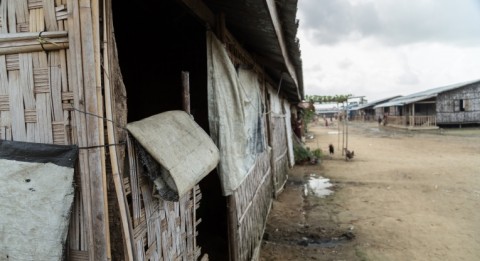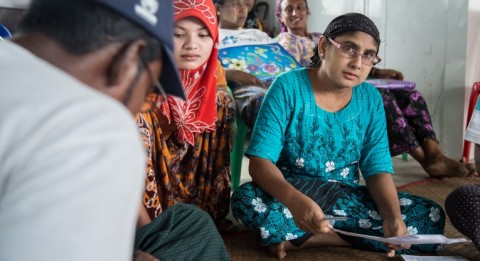The worst thing at IDP camp is lack of education
Ethnic violence forced Dan Nyo Nyo to flee her home. She is now living at IDP camp in Rakhine state in Myanmar with her family. Her biggest concern is the suspension of her children’s education.
Ohn Taw Gyi South is one of 60 IDP camps in Rakhine state, North-West Myanmar. Many came to the camps from the town of Sittwe, where the hostilities between Muslims and Buddhists erupted into fully-fledged violence in June and October of 2012. 200 people were killed and several houses burnt. The entire state entered into full crisis.
Tens of thousands were forced to leave their homes, their work and schools behind. Dan Nyo Nyo, 42, travelled for nine hours by boat with her family to reach the Ohn Taw Gyi South camp.
“We were utterly hopeless. We had to flee. The boat carried over 60 people. Thankfully we didn’t have to pay as the owner of the boat was my cousin”, says Dan Nyo Nyo, a mother of five.
She lives in the camp with her husband and three children. At the beginning the family settled to a small village with population from the same ethnic group. After seven months the government officials decided to move them to the Ohn Taw Gyi South camp, a short distance away. This was in July 2013.
Bamboo walls keep nothing private

For nearly two years, Ohn Taw Gyi South has been a temporary home to hundreds of families. People’s lives are cramped and without privacy, living in these long and dilapidated bamboo houses. Humanitarian organisations are trying to decide what to do with the camp that was meant for two years. It’s time is almost up.
Now Dan Nyo Nyo works hard to help the residents of the camp. She’s in charge of a team of semi-volunteers, leader of a women’s group and a member of education work group.
“I want to help here, and I no longer feel homeless.”
The living conditions at the camp are far from ideal, and life is stressful. Ohn Taw Giy South is closed from the rest of the world, and the residents can’t leave to visit the town, school or health service facilities. People are frustrated.
Dan Nyo Nyo and her family live in a bamboo house, shared with seven other families. Each family gets a hallway and one room.
“Neighbours are just behind the bamboo walls. You can hear everything, fights and despair. A lot of the men have a drinking problem and are violent. Women’s situation is the hardest in the camp.”
“As a leader of a women’s group, I listen to them and try to solve their problems. Sometimes that means divorces.”
Two hours of schooling each day
Izali Thet Mon, 9, a daughter of Dan Nyo Nyo, is on the 3rd grade at primary school. The temporary school is being supported by Finn Church Aid. School starts at 1 p.m. and lasts for two hours.
“The schools here are completely different from home. Here the teachers only have middle school qualifications, whereas in our village they had teacher’s qualifications”, Dan Nyo Nyo says.
Only few get to go to the temporary schools. Teachers are camp’s residents who have received one week’s training. Three teachers are teaching two separate classes in three shifts during weekdays. The students are noisy, but the teachers are well liked. At least everyone gets to learn how to read and write.
There are no middle schools or upper secondary schools at the camp. One can only dream of going to a university. Moving to go study in one would require an ID card, which none of the camp residents have.
“My youngest son can’t continue his studies here. If he doesn’t get to go to university, it would be a terrible loss”, Dan Nyo Nyo says.
To continue his studies, the whole family would have to move to Yangoon, the largest city of Myanmar.
“We cannot afford to bribe the officials, we just have to wait for things to change”, she says.

The semi-volunteer employees of the camp come together for coordination meetings three days a week. Dan Nyo Nyo (right) is heading the meeting of the day.
My salary goes to those most in need
In the meantime, Dan Nyo Nyo does her best to help people living at the camp.
“I am good at mobilising people. My husband and my oldest daughter are also helping the people. If we were to go, everyone would be unhappy.”
Her monthly salary is 40 euros.
“I give it to others at the camp. For medicine and other necessities. We have two sons working in Malaysia, who send us money for living, so we are ok”, she says.
“I want to help people here and live here. But, for the sake of our children, we have to move.”
Rakhine state in Myanmar has long suffered from ethnic tensions between different ethnic groups in the region. Dividing the groups bluntly; between Muslims and Buddhists. There are approximately 140 000 internally displaced people (IDP) in the region. Lutheran World Federation implements Finn Church Aid’ Education in Emergencies – programme which is funded by ECHO. The primary schooling of children and youth of both communities are being supported at their IDP camps.
Text: Eeva Suhonen
Photos: Ville Asikainen
